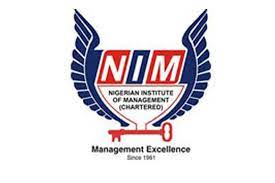The Nigerian Institute of Management (NIM) has called on the Federal Government to pursue strategic plans by implementing policies to sustain economic growth.
The President of the Council, NIM, Mrs Patience Anabor, made the call at the ongoing 2021 Annual National Management Conference of the Institute on Monday in Lagos.
The theme of the three-day conference is: “Managing the Impact of Global Recession: The Nigerian Peculiarity”.
The aim is to provide stakeholders a platform to brainstorm on burning governance and leadership issues of national importance.
Anabor said the theme was critical because of the enormous challenges confronting the global economy, which according to her resulted from several factors orchestrated by COVID-19 pandemic.
She said the collapse in oil prices, coupled with the COVID-19 pandemic plunged the Nigerian economy into a severe economic recession in 2020, the worst since the 1980s.
Quoting the latest World Bank Nigeria Development Update, Anabor said before COVID-19, the nation’s economy was expected to grow by 2.1 per cent in 2020, but contracted instead by 3.2 per cent, leading to a five per cent reduction in growth.
Anabor said, “The projection assumed that the spread of COVID-19 in Nigeria is contained by the third quarter of 2020.
“If the spread of the virus becomes more severe, the economy could contract further.”
She further noted that though major causes of recession included high inflation, accumulation of debt servicing, especially foreign debts; including over-reliance on FG revenue.
“It is not abnormal for a market economy to go through a business cycle of boom, recession and recovery. What matters is how long the phase of recession is effectively managed to avoid a depression,” she said.
She pledged the institute’s support to bequeath a well-trained and productive workforce to aid the nation’s development.
The Board Chairman, Access Bank Plc, Dr Ajoritsedere Awosika, said the nation’s response to the global recession of 2020, the Nigeria Economic Sustainability Plan (NESP) helped to mitigate its effects.
NESP was a N2.3 trillion stimulus plan to mitigate the effects of recession, while also ensuring social stability and addressing long-standing economic vulnerabilities.
The outcome of the intervention was that Nigeria exited recession earlier than forecasted.
“Nigeria’s economy grew by 5.01 per cent y/y in Q2:21, which was a third consecutive quarter of growth, after having exited recession in Q4:20 with growth of 0.11 per cent y/y.
“However, these were suboptimal growths,” Awosika said.
She recommended that government should deliberately enhance macroeconomic management to boost investors’ confidence; consistently implement right policies to stabilise, run and grow the economy.
NIM urges Nigeria to implement policies to grow economy
RELATED ARTICLES




